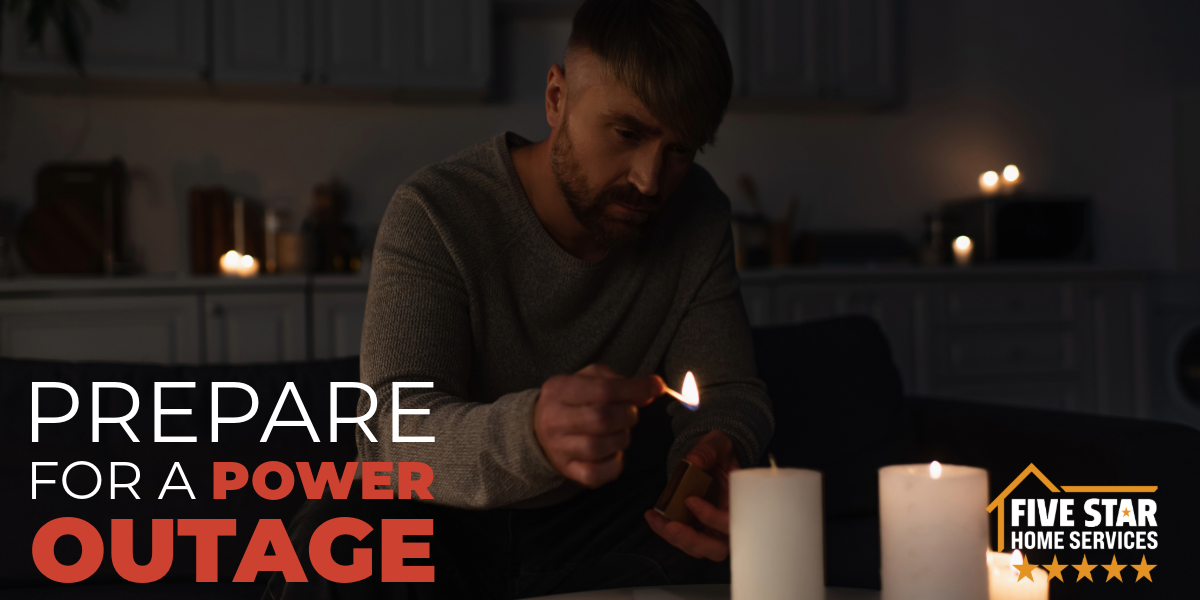Picture this—you’re settling in for a cozy evening at home, dinner is in the oven, the kids are finishing up their homework, and suddenly… the lights flicker and go out. A few moments later, you realize the power’s not coming back anytime soon. The fridge contents are at risk, the heating or cooling is off, and even charging your phone seems impossible.
With Ohio’s storms, our aging power grid, and unexpected blackouts on the rise — power outages are becoming more and more of a part of modern life. But here’s the good news — you can be prepared. Make sure to include an aid kit in your emergency supplies to cater to the needs of your entire family. This guide will walk you through the essential steps to prepare for outages, the benefits of having a home generator, and how to choose and maintain one.
Why Prepare for a Power Outage?
Power outages can do more than just disrupt your day—they can also have serious consequences for your home and family. We at Five Star know this all to well. So here are a few reasons why preparation is important:
- Spoiled Food: Without refrigeration, perishables can go bad within hours.
- Loss of Security: Home security systems may shut down, leaving your property vulnerable.
- Safety Risks: Without lights, navigating your home can lead to accidents, especially for young children or seniors.
- Health Concerns: For homes dependent on medical devices, loss of power can be life-threatening. It is crucial to have a plan for individuals who rely on electric or battery-dependent medical equipment, such as breathing machines and wheelchairs.
- Daily Disruptions: From remote work to meal prep, all the little conveniences we take for granted come to a halt.
Preparation is the key to protecting your home, maintaining comfort, and preserving peace of mind during power outages. At Five Star Home Services, we are here to keep you prepared.
Critical Steps to Prepare for a Power Outage
Power outages can be unpredictable and stressful, but with a little preparation, you can handle them with ease. Here’s a simple guide to help you stay ahead of the storm or blackout and keep your household safe and ready.
1. Create a Power Outage Checklist
Having the right supplies on hand is the key to staying comfortable and safe during an outage. Here’s what you need:
- Emergency Supplies: Stock up on flashlights, fresh batteries, candles (with holders), and safety matches. You’ll thank yourself when the lights go out!
- Non-Perishable Food and Water: Make sure you have a 3-day supply of essentials like canned goods, dry snacks, and bottled water for everyone in your household.
- Portable Chargers: Fully charged power banks are lifesavers when devices run low on battery.
- Backup Lighting: Battery-powered lanterns or LED candles are safer alternatives to open flames.
- Carbon Monoxide Detectors: Double-check that your carbon monoxide detectors are working properly, especially if you plan to use a generator.
2. Inspect Your Home’s Electrical System
Before an outage hits, make sure your home is ready to handle backup power and avoid electrical hazards.
- Evaluate Your Electrical System: Check that your wiring and outlets are up-to-date and safe for generator use. Know where your circuit breakers and fuse boxes are located so you can act quickly if needed.
- Identify Hazards: Outdated wiring can be a fire risk, so it’s worth having a professional inspect your home for safety issues. Specialized electrical equipment may also be necessary if you rely on medical devices or similar equipment.
Taking these steps ahead of time will give you peace of mind when the power goes out.
3. Develop a Family Plan
Is everyone in your household ready for an outage? Make sure you’ve got a plan in place that covers these basics:
- Know Your Supplies: Everyone should know where the emergency kit is stored.
- Stay Connected: Establish a meeting place or ensure devices are charged beforehand to stay in touch.
- Safety First: Teach your family how to safely use candles, flashlights, and generators. Remind them to steer clear of downed power lines and report them immediately.
A little preparation goes a long way in keeping your family safe and calm during outages! For even more detailed tips, check out this helpful Power Outage Preparedness Guide.
How Home Generators Keep Your Home Running During Outages
When the power goes out, home generators are your reliable backup solution. But are they worth the investment? We think so! Here’s why:
Why Invest in a Home Generator?
Seamless Power Restoration
A home generator automatically powers essential appliances—like your refrigerator, HVAC system, and even medical devices—when the grid goes down. No more stressing about spoiled food or uncomfortable temperatures during an outage.
Enhanced Safety
Keep your home well-lit and your security systems running without interruption. Just remember, safety is key! Proper installation and precautions against carbon monoxide emissions are essential for safe generator use.
Preserve Everyday Comfort
Don’t let power outages disrupt your daily life. With a generator, you can keep the lights on, stay connected to the internet, and maintain heating or cooling systems to stay comfortable.
Types of Home Generators
When it comes to choosing a generator, there are two main types to consider:
Portable Generators
These are a budget-friendly option for covering a few essential devices during an outage. Portable generators do require manual operation, but they’re a great choice if you’re looking for flexibility and affordability.
Standby Generators
For hassle-free, whole-home coverage, standby generators are your go-to. They automatically kick in when the power goes out and provide reliable backup for your entire home. While they cost more upfront, their convenience and reliability are hard to beat.
Choosing the Right Portable Generator for Your Home
Power outages can be frustrating, but the right generator can keep your home safe, comfortable, and functional. Here’s a step-by-step guide to help you choose the perfect generator for your needs.
Step 1: Assess Your Power Needs
Start by listing the appliances and devices you’ll want to keep running during an outage. Think essentials—like refrigerators, lights, or medical equipment. Not sure how much power they need? Tools like online power calculators are a big help. For detailed guidance, check out our article on whole home generator costs.
Step 2: Compare Generator Types
Not all generators are created equal. Portable generators are an affordable and great for smaller power loads. Perfect for short-term outages or powering a few essentials. Standby generators offer whole-home coverage and kick on automatically when the power goes out. Ideal for long-term reliability.
Do some research, explore trusted brands, and read reviews to find a model that fits your energy needs—and your budget.
When to Call a Professional for Generator Installation
Installing a generator might seem straightforward, but it’s a job best left to licensed electricians. Proper connections are essential for safety, as they prevent surges, fire risks, and hazards during public safety power shutoffs, which is especially important in wildfire-prone areas.
Additionally, professionals ensure your installation is fully compliant with all local regulations and standards. If you’re in Columbus, Dayton, or Cincinnati, Five Star Home Services offers expert generator installation tailored to your home’s specific needs.


